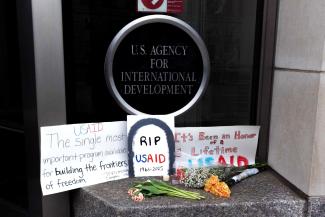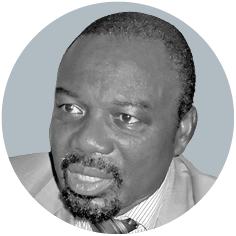West Africa
Trump is encouraging African despots

US President Donald Trump seems determined to abolish USAID. The agency’s funding has been frozen. What impact does that have on Ghana?
It is very bad. Our government is cash-strapped after a serious financial crisis. Many public services depend on official development assistance (ODA). USAID is probably the most important bilateral aid agency, so many people will be affected.
Samantha Power, who was the administrator of USAID under President Joe Biden, says that 50 % of the not quite $ 40 billion budget went to the health sector at the international level and in various countries.
Well, I do not know what the exact healthcare share is in Ghana, but it is obvious that many health-related initiatives have been depending on USAID. This agency has been funding awareness raising in regard to Covid-19, Ebola and HIV/AIDS for example. It has been training hospital staff and supported the construction of hospitals. The list goes on. It also matters that USAID has been funding research projects. These projects help our medical scientists to understand the health challenges Ghana faces and how to tackle them. When their work is disrupted or even discontinued, they become less able to help us. Future health crises will thus hit us worse, because they will hit us unprepared.
The funding freeze is actually illegal. US presidents neither have the authority to change expenditure decisions made by the two chambers of Congress nor to dismantle agencies established by Congress. USAID was initially set up by an executive order, but later confirmed by Congress. Perhaps the money will be flowing again soon? Some of the decisions have been suspended by a temporary court order.
Yes, but no one knows for how long, nor how much of the money will flow again, nor what will become of USAID as an institution. Trump pretends to be above the law and is testing what he can get away with. He is an erratic leader and sometimes takes pride in his unpredictability. He probably does not want to know how that affects us and obviously does not care.
The harm is not limited to healthcare, moreover. Aid money plays an important role in our education system, for example. Some communities in the north of our country, which is the poorest region, even depend on food aid. Some of it is now frozen, and the rest is in limbo. Quite likely, some people will die. Trump’s approach to ODA can only destabilise our country. And that is no different in many other countries with low and lower middle incomes, if they have been enjoying USAID support.
Early in Trump’s first term, Trevor Noah, the South African TV comedian who rose to world fame in the USA, produced a very funny clip in which he compared Trump to corrupt and despotic African leaders. Do you recognise the pattern?
Yes, there are striking similarities, including the preposterous posturing as a strongman who is in charge of everything and anything or the habit of surrounding himself with sycophants who only tell him what he wants to hear. The personality cult around Trump feels like what African dictators typically cultivate. It actually fits the pattern that his public statements often lack coherence and even plausibility, which adds to the sense of unaccountability. On the other hand, Trump is different in some ways. He is transactional in the sense of being keen of striking some kind of deal that he can celebrate as a major success. He is also eager to dismantle institutions, whereas African autocrats tend to try to use institutions. They know they need them to get things done, so they will do their best to manipulate them, but not to destroy them.
Do autocratic leaders in Africa feel encouraged by Trump?
Of course they do. They like his “America first” attitude. It allows them to promote their own kind of nationalism in the sense of “Zimbabwe first” or “Burkina Faso first”. They also know that, in this new Trump era, what they do will get less international attention. Global standards, multilateral agreements and supranational alliances are becoming less important. Trump is even attacking the International Criminal Court, which African despots fear and therefore hate.
You just mentioned Burkina Faso. In a previous interview in 2023, you told me the military coup there was different from conventional coups in Africa. You said the same about Mali and Niger. Your argument was that these military juntas had grabbed power not primarily to enrich themselves, but to rescue disintegrating states. Has your assessment changed?
No, not fundamentally. In the eyes of their people, the three military regimes have strong legitimacy. The elected leaders had failed in several ways. People lacked opportunities. They did not see their countries develop in ways that improved their fates, even though policymakers had promised that kind of development. At the same time, jihadi violence kept getting worse. It did not help that the elected politicians were in thrall to France even though French troops, who were supposed to support security forces in the anti-terror struggle, acted with ignorant and arrogant brutality. All three countries are more stable again, even though jihadi violence remains quite dangerous there.
Nonetheless, you do not fully endorse the new military dictators, do you?
Well, governments should be accountable to citizens. By definition, military regimes aren’t. Even if they start out with good intentions, their attitude may change fast. Moreover, tensions within the military itself can lead to the next coup. In my opinion, that risk is quite high in Burkina Faso because of tribal frictions within the armed forces, for example.
That said, how the Economic Community of West African States (ECOWAS) responded to the coups, was not smart. It actually strengthened the new military regimes because it looked like ECOWAS was attacking them on behalf of France and other western countries. Moreover, it was clear from the start that the military intervention that some ECOWAS leaders proposed would not have been feasible. Nor would it have made sense. The three countries concerned needed support in view of rampant terrorism, not sanctions. In my candid opinion, the ECOWAS should have supported security forces there, and it would probably still be wise to do so with an eye to repairing relations.
But Mali, Burkina and Niger have quit the ECOWAS.
In formal terms yes, but the debate goes on, and an option to reconsider the step in the next three months was agreed. We need West African cooperation and solidarity. Something that many western observers do not understand, is that regional integration is more important here than in Europe. Our tribal communities typically live in areas that belong to different states. Consider the Hausa/Fulani, whose herding communities have roamed the entire Sahel zone, from Mali in the west all the way to Niger and Nigeria in the east for centuries. They feel loyal to the tribe more than to any state. Some of them actually lack formal citizenship to any country because they do not have any documents.
West African state agencies are largely absent from remote areas (what is normally called “ungoverned spaces”), but community cohesion is strong across borders. As a matter of fact, the three juntas’ exit from the ECOWAS has not affected trade and will not do so in the future. It has not made a real difference in people’s daily lives. I think the ECOWAS should be open to rebuilding relationships with the three military regimes. They may not be elected, but they enjoy people’s trust so far, and they are trying to repair damage caused by the failure of elected leaders. The better cooperation works out, the less likely it will become that the new military dictatorships will revert to the kind that reminds me of Donald Trump.
Vladimir Antwi-Danso is dean emeritus of the Ghana Armed Forces Command & Staff College (GAFCSC).
vladanso@yahoo.com













